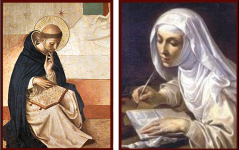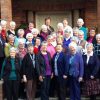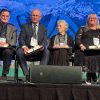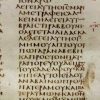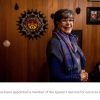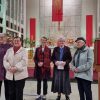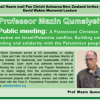 DOMINICAN LAITY
DOMINICAN LAITY
Newsletter #27
April 2013
Dear Friends
The visit of Fr David Kammler is past, and so many people found his message powerful and encouraging. In the short time he was here, he met and ate and shared his enthusiasm for the lay Dominican movement with people in: Auckland; Whangarei; Palmerston North; Wellington (where the Archbishop helped us with projector technical problems); Dunedin; Gore; Invercargill; Queenstown and Arrowtown. Enjoy some of the wonderful pictures on our website, http://www.dominicans.org.nz/
People from many places sent their reflections of their experience with David. Some of the comments:
Hopes for the future…
shared at the Dominican Laity Day of Journey – 2 March 2013, Waiheke Island
• Support the Dominicans – stand by them
• Pray for and help each other
• Try to encourage the younger generation back into the church
• Invite a few young people to talk about the faith and what is happening in their lives – reflect on Jesus
• Keep on keeping on
• Better co-operation between groups of different faiths – Catholics, Muslims … invitation to dialogue – important that people stay where they are but that recognise what is good in others
• Communication within our wider community of Dominican values/ways. Keep the communication coming and gather from time to time with someone who can share something of our Dominican values.
• Peace Place at Emily Place is a good central venue close to bus stops, rail and ferry. Already has a variety of groups operating – Pax Christi, meditation groups, Burma movement. Peace Place is a place that could be utilised for gathering but very hard to find a time that suits everyone.
• Spirit of inclusiveness/openness. Keen to know more about the Dominican charism and build a community/network like this. Counter connection in the Church – suggestion that we lead young people into closer connection with God rather than away.
• Value of Dominican charism. My dream is that we become more confident in the values, supporting one another.
• Charism of study/learning. I’ve been connected to the Dominicans for many years but I don’t feel like I’m up to date with the Dominican charism.
• Recommend that we all get on the mailing list with Pleroma as they have great books that are readily available.
• Growing interest in contemplation in NZ. Recently learned of the NZ Contemplation Network which has an inter-faith component.
• Chris shared that St Peter’s College have introduced meditation with students sending 2 minutes in silence every day.
• David shared about the 7 annual themes leading towards the 800 year jubilee of the Order in 2016. He also talked about L-plates – we Dominicans retainer our Learner status for our lifetime.
• Let’s gather one night a week – meet at Emily Place.
• Increased usage of the Peace Place would be great. It is open for groups. Fr Allan Roberts is leading contemplative prayer at 11am and 7.30pm on each Wednesday during Lent.
• Mary-Anna started a prayer group that ran for 6+ years. Would be good to restart something like this.
• The Peace Place is a predictable, hospitable place. The Dominican Friars welcome groups but don’t want to be responsible for programming meetings etc.
• Try to encourage a sharing presence of each other.
• Reality is that we NEED to meet together in shared groups. The website is a really useful forum as a notice-board and a way of sharing information, reports etc.
Teresa McNamara, Auckland
……………………………………………………………………………..
Palmerston North: meeting with the Family in the lower North Island 3 April
We began with a short prayer based on Lectio Divina with today’s gospel reading of Moses and the burning bush. Fr David showed a picture of Moses and the burning bush and reflected on it. It depicted Moses, taking off his sandals and holding a staff. Yahweh told Moses to take off his sandals because he was on holy ground. He sent Moses off to journey, (hence the staff) over the border, out of his comfort zone. Treading on the ground, barefoot, he would be in touch with reality, just as we are when we walk barefoot over stones.
The burning bush symbolises energy, enlightenment, enthusiasm, love, compassion and enthusiasm.
‘Yahweh’ was translated by Martin Buber as meaning ‘I am where you are’. (See psalm 23 ‘Even were I to walk in a ravine as dark as death, I should fear no danger, for you are at my side.’)
The Dominican charism is to praise, to bless and to preach. Fr David reminded us that each and everyone of us is special and we are part of an interdependent family. Fr David described St. Dominic as the father of good news. The way we follow Jesus is through professing/preaching the gospel. He showed us a picture (copies of which he gave us later) depicting Sts Peter and Paul giving St Dominic a staff (to journey with) and a bible (to preach with).
Fr David then took us on an inspiring journey to all corners of the earth, visiting lay Dominican families with him.
Statistics: there are 3000 Dominican sisters, 6000 Dominican friars, 190,000 lay members and altogether 200,000 persons in the Dominican family, most of them being lay people. Prayer, study, community and preaching are elements in all branches and Fr David organised the rest of his talk with examples of each of these aspects.
Some branches consist of people sharing the same household, in others people come together to pray, or study or work together at regular intervals.
Prayer
‘An example of the extended Dominican community in Europe is when they pray in unity at 8pm on Tuesdays, for the special intentions requested by people all over Europe on their website.
We heard about the professed lay Dominicans in Vietnam, 105,000 of them, because the communist government allowed them to gather in small groups, seeing them as old grannies saying the rosary, and thought them harmless.
Study
We learnt about a huge diocese in Mexico (200,000 square kilometres) with many lay Dominican leaders. They come together to learn about the many different Christian sects among them, so that they can respond appropriately to what is taking place and to the number of Catholics going to join other denominations. They are discerning the signs of the times.
Community
Communities are not necessarily living under the same roof. Many people live separately and come together regularly to meet and to work, pray and celebrate. They do so within and not apart from their parishes.
Preaching
Like St. Paul, we preach in the market place and the pulpits of the lay Dominicans look much the same wherever Fr David goes. He finds people preaching through example in our secular environments through engaging with politics, with society and using modern media. He gave an example of a family of lay Dominicans working out how much time they had to spare, when and for how many families. They gather on Saturday mornings for a day of solidarity and prepare a meal for 80 families. They provide catechesis, prayer and games for the children, showing active love. In this way they authenticate the word of God. Dominican schools also preach through education and sharing values.
No place too remote
Fr David showed us a wonderful greetings card from a group of life prisoners who have become lay Dominicans, given to him in thanks for his presence and visits. Through forming a lay Dominican family, they have hope for the future. They recognise that God’s grace grants us a new future and have a rule not to discuss their past lives and crimes.
‘Every saint has a past, but every sinner has a future.’
He reminded us that our formation as lay Dominicans involves conformation (formation as a Christian); information (political awareness, attentiveness to what is happening in our communities) and transformation, putting social justice principles into practice.
Finally Fr David suggested we are each, individually, like a pixel or a mosaic stone, and it is only as we come together that we make a picture. Together we can make visible the face of Christ, and he showed us a mosaic picture of Christ.
Mary Nash, Palmerston North
……………………………………………………………………………..
Palmerston North, Take 2: An inspiring family time with Fr David Sunday 3 March
We began with prayerful study of the passage of the burning bush from the Book of Exodus. We reflected briefly on: the burning bush; God speaking through the elements; The enormity of I AM speaking of the pain of His people; the significance and attraction of small communities sharing the reality of their lives being transformational and brings conversion; the echo of burning hearts on the road to Emmaus (and our own burning hearts); taking of our sandals and feeling the holy ground; Moses caught in the midst of ordinary every day work; Moses had taken his flock to the far side of the wilderness , the need to stretch our limits; the call to Moses to return back to the place of pain; fire a symbol of destruction and regeneration; Aotearoa still a land of milk and honey (damage to our ecology); ….sorry I didn’t get all the points….
Fr David used a power presentation to speak of the Dominican four pillars of and for the laity; and that Dominic was rooted in the Gospel (always pointing to the Gospel); and those inspired by Dominic are like an enormous tree all parts of which are necessary and equal within the Dominican family. He used pictures to illustrate the following:
• Community prayer can take place in innovative ways through media and social networking removing isolation e.g. in some countries every Tuesday night at a definite time
• We study not to have an invisible library in our heads but so as to more adequately respond to challenges
• For the laity we must preach where we are. We all have a preaching pulpit. A German Jew theologian (Bauer?) translates “I AM” as “I AM WHERE YOU ARE”
• Jesus preached with his 33 years of life not just the 3 years as an itinerant. Cf www.word.op.org
• Remember “every saint has a past, every sinner has a future”. Communities forming behind prison walls can be supported during and after imprisonment by Dominican laity
• Supportive communities for groups with special needs, e.g. migrants, can be built up by Dominican laity sharing evening prayer and shared meal
• Junior Dominican groups in Argentina go out on mission to distant small rural communities AND return again and again
• Dominican laity can help the marginalised as their mission – just ask ourselves “What can we do?” “What time do I have?” (some commit to a Saturday morning)
• In these ways Jesus’ love becomes authentic and credible through the love of the laity – we are small lights from the light of Christ
• When the word ‘FORMATION’ becomes Confirmation / Information / Transformation – see / judge / act is possible out of these four pillars
• Be careful to turn ACT into action not activism
• What we absorb through prayer and contemplation (colour black) we reflect back as light (colour white) – hence the Dominican habit! Picture of Dominic pointing to the Scripture. Father David’s comment, “Dominic did not want to be Dominican. He wanted to be Christian.”
• Be confronted with real life without shoes Father David pointing to a blue power point screen said, “ We are pixels, small parts of a whole. We are like broken pieces of a mosaic coming together in our brokenness to make a whole.”
Kay Blackburn, Waikanae
……………………………………………………………………………..
Fr David Kammler’s Visit to Invercargill
Katie O’Connor conveyed Fr David to Korimako from Gore where he had spent the day. He had time to settle in before we took him to the Maori Catholic Marae, Te Tomairangi which is situated behind the Basilica on the site of the former St Joseph’s School which had moved next door to the former St Catherinés College building, both Dominican founded schools. After the powhiri Fr David had the carvings explained to him, as one holds the story of Catholicity in Aotearoa and Invercargill in particular and the other the Maori creation story. We all then shared a meal in the Whare Kai.
Next morning we watched the new Pope emerge on the Vatican balcony and shared prayer before heading off to a haka welcome at St Joseph’s Primary School. David then spoke to the senior class. After explaining the part of the planet he came from he then put on his Dominican habit and one of the children thought he was the new Pope! His “hoodie” was much admired.
Later that morning we went to Verdon College where we lunched and had time to chat with some of the staff in their staff room. David then spent the afternoon speaking to students in two classes before returning to Korimako. After a rest he spent time meditating in the Peace Garden. We headed off to the Public meeting (after tea prepared by Raewyn) which was held in St Patricks Parish Room in South Invercargill. Twenty participants greatly enjoyed his presentation and his colourful resources. Most stayed on and the lively chatter over the shared supper completed a most fruitful day.
We left next morning at 10am for Five Rivers Café which is approximately half way to Queenstown. Colin Bellett from Arrowtown met us there where we enjoyed lunch together before we farewelled David off on the next stage of his journey to Queenstown.
Sr Judith Robinson OP, Invercargill
……………………………………………………………………………..
I am where you are.
These were the words Fr. David left with us to ponder.
I was pleased to be part of the welcome for this enthusiastic Dominican on his recent visit to Arrowtown and Queenstown.
Sisters Raewyn and Judith drove David from Invercargill to the Five Rivers Cafe, a convenient half way meeting point about 90 minutes drive down from Arrowtown.
After lunch there I enjoyed the drive back to Queenstown during which time I was able to brief him on the many and varied activities of the Dominican family in the Wakatipu area.
Fr David had a session with children, parents and supporters of the St. Joseph’s school, and those who travelled over from Arrowtown.
Fr. David also assisted at the Sunday Masses and spoke enthusiastically to the parishioners about his work with Dominican laity throughout the world.
On Monday morning he joined the Arrowtown scripture group for a very prayerful sharing of the Word. Then we were treated to a fascinating slideshow, with his commentary, about the many and varied groups and places that he has visited over the last few years of his Rome based work of ministry to Dominican laity worldwide.
Fr. David left us encouraged and hopeful for the continued lively role of the Dominican family wherever they are to be found.
David was able to spend a bonus day in the area due to flight disruptions. I am sure that he enjoyed his time here as much as we did, having him.
Colin Bellett, Arrowtown
……………………………………………………………………………..
Fr David Kammler op in Auckland and Northland
David’s visits to Auckland and Northland brought us all a great deal of joy and encouragement. He spent time with different groups at a range of venues. This account is made up of short reflections from individuals who were present at the different venues.
The first visit was to Mary Johnson’s place. Mary wrote:
On the day 28th Feburary 2013, it was so beautiful day. I invited 6 Deaf friends who liked to meet Father David. All of them really enjoyed it and glad he understand our Deaf culture. Our thanks to our interpreter, Felicity Crowe, was wonderful between sign and talk.
Special thanks to Teresa and Susan for arranging the day of our visit.
I am very impressed with wonderful Dominican family and the lovely people we met on Waiheke Island. And I really enjoyed the time with Father David Kammler OP
The next visit was to Whangarei and was hosted by Hana Maxwell-Mathias. Maria Tu’inukuafe from Pakaraka Junction said:
Meeting with Fr Kammler gave me a renewed sense of hope and reaffirmed my Dominican identity. Hana opened our gathering with a moving mihi in Maori. She spoke beautifully, making the link to tangata whenua, to the people and the land, the mountains and rivers with which they are irrevocably connected. Thus, my heart was already awakened to the Spirit of God and receptive to Fr Kammler’s presentation about the Dominican family and its pillars of community, prayer and study. I liked him emphasising that this was a lifelong formation in service of spreading the gospel. I felt that all that I do, from conserving water to learning elementary biblical Hebrew, has a purpose.
Fr Kammler also talked about the work that other Dominican laity do in different parts of the world, such as Vietnam and South America. It was inspiring to hear of their faith in action and how willing they were to serve others. I felt connected to them and part of a worldwide family ready to proclaim Christ in the most vulnerable situations.
I left Whangarei with a full heart .Living in the far North I have often experienced feelings of loneliness and isolation, even in our church community. Probably the greatest gift I received from our gathering was a sense of interconnectedness, of belonging to a group of people with a purpose and vision of a world where justice and fullness of life for all are not just empty words.
On Saturday 2 March, 18 of us travelled by ferry over to Waiheke Island to join Dominicans there and one Franciscan in a day of reflection on our Dominican journey. We were very grateful to the Waiheke community for their thoughtful hospitality. Mary and Pat Sullivan from Waiheke wrote these thoughts on David and his visit:
Thoughts: An amazing person; obviously devoted to what he is doing; the strength of the Dominican family worldwide; the good that can be and is being done at base roots in the community; the outreach to those in need; the brain is also engaged as well as the heart. Fr David is really passionate about his job and the contribution Dominican families make in all corners of the world. It was really good occasion for our little community here in Auckland and it will surely help us to continue our efforts. Cheers, Pat and Mary.
On returning from Waiheke, Teresa and David went out to spend the evening with the Friends of St Bens Community. Ali Bryant shared this:
Fr David met with us for mass, dinner and informal discussions at Sue’s house. David was able to see who we are and what we do. Counselled us to keep the door open to the authorities but also to keep on connecting to God – and that we were doing so in much the same way that the early Christians would have done. Many of the groups he meets with are similar to ours – but “not as far along as us!” That was a surprise. He gave us a sense of belonging to a much bigger picture. An enjoyable evening with a wonderful, gentle-man.
Our thanks to the organisers for their initiative and hard work.
David’s generosity was shown when he came to Pompallier Centre on Sunday, 3 March, for his fifth presentation in four days. More of the Sisters and Friars came to this, as well as a number of laity who hadn’t been at the other meetings. Charles Grinter had this to say:
I had many pleasant occasions to meet Fr David Kammler on his visits to Auckland and in particular was part of the group of Dominican Family members that met at the Pompallier Centre one Sunday afternoon. I arrived way too early, so went away and came back again! The meeting was richly rewarding in three ways: Firstly I found out more about Fr David and through him about the ways in which lay Dominicans live and love around the world. Of special interest to me was the group in the USA that is made up of prisoners, since I am much involved in that ministry. Secondly, it was a great opportunity to catch up with my sisters and brothers in the order and to share our experiences. One result of this was going to a great concert with Cecily later that week. Finally, I felt personally encouraged in my work and prayer and strengthened in my Dominican path. May God bless all those who do so much work for us all.
On his return to Auckland on 20 March, David visited St Dominic’s College in Henderson where he spoke with all of the Year 12 girls. Philomena Clare, one of the staff, wrote:
Fr David Kammler a Dominican priest from Germany but residing in Rome visited our school in March. He spoke to students about being part of the Global Dominican Youth Movement. This is a world wide movement where young people volunteer their time to be involved in projects to help the disadvantaged. Here youth being light to people living in darkness. More information can be sourced from http://www.dviop.org
Then, on the evening of the same day, David gave a public presentation. This meeting was convened by John Collins who said:
Fr.David spoke to a group of about 40 people at the Columba Centre in Auckland a few days before leaving NZ. His travels have taken him to more than fifty countries where he has visited Lay Dominican groups. In the course of this experience he discovered that Lay Groups function in very different ways from place to place. In some countries Lay Dominican groups are widespread and provide a comprehensive community structure for Christian lay vocation. In other places small groups of Christians with a Dominican ethos have formed communities and often taken on roles in areas of unmet need. Many fascinating examples of Dominican groups were presented which were both humbling and inspiring. He emphasized that there is no one right way to live out our calling. What we do individually and as groups in this country will be unique and will reflect who we are as individuals, as followers of Christ and as kiwis responding to perceived needs. His view of the Dominican calling is that it is a shared calling for all who are drawn to the founding principles of Dominic. He implied that the traditional separation of friars, sisters (active and contemplative) and lay people can lead to a narrowing of perspective and roles for those in each group. Paul’s body of Christ analogy was applied to the Dominican family and all Christian people. We learn from one another. We are called to serve and be served. Many of those present had long Dominican associations and there was lively discussion at the meeting and afterward. Fr. David’s visit has helped confirm the approach we are taking here and challenged us to broaden our vision of the possible.
……………………………………………………………………………..
ADVANCE NOTICE: North Island retreat
Fr Donagh O’Shea OP from the Dominican Retreat House, Dublin will be in NZ for the month of September.
I have booked El Rancho at Waikanae for a Meditation Retreat for the weekend 6 – 8 September.
Prices for full board are:
Accommodation $35 per night = $70
5 meal package = $60
Total $130 each for the weekend. There may be other small charges eg tea & coffee etc.
I would appreciate EXPRESSIONS OF INTEREST by 20 May or preferably as soon as possible. Confirmation can be made later.
Many thanks
Sr Roxane OP 04 477-0751 or domswn@clear.net.nz
___________________________________________________________
FOR REFLECTION THE OPEN DOOR Pope Francis
(From his Pastoral Letter of October 2012, as Archbishop of Buenos Aires)
Dear Brothers and Sisters:
Among the most striking experiences of the last decades is finding doors closed. Little by little increasing insecurity has made us bolt doors, employ means of vigilance, install security cameras and mistrust strangers who call at our door.
None the less in some places there are doors that are still open. The closed door is really a symbol of our life today. It is something more than a simple sociological fact; it is an existential reality that is imposing itself as a way of life, a way of confronting reality, others and the future.
The bolted door of my house, the place of my intimate life, my dreams, hopes, sufferings and moments of happiness, is locked against others. And it is not simply a matter of the physical house; it is also the whole area of my life, of my heart. All the time there are fewer who can cross that threshold. The security of reinforced doors protects the insecurity of a life which is becoming more fragile and less open to the riches of the life and the love of others.
The image of an open door has always been a symbol of light, friendship, happiness, liberty and trust. How we need to recover them! The closed door does us harm, reduces and separates us….
God always takes the initiative and He does not want anyone to be excluded. God calls at the door of our hearts: Look, I am at the door, calling: if anyone hears my voice and opens the door, I shall enter his house and dine with him and him with me (Rev.3.20)….
Crossing through that door presupposes the beginning of a way or journey that lasts a lifetime, as we pass in front of so many doors which open to us today, many of them false doors, doors that invite us in a very attractive but lying manner to go down that road, promising an empty narcissistic happiness which has an expiry dated: doors that lead to cross-roads where, no matter which option we follow, will, sooner or later, cause suffering and confusion, doors focused on self which wear out and have no guarantee for the future.
While the doors of the houses are closed, the doors of the shopping malls are always open.
One passes through the door of faith, one crosses that threshold, when the Word of God is announced and the heart allows itself to be shaped by that grace which transforms. A grace which has a concrete name, and that name is Jesus. Jesus is the door (Jn 10:9). He, and only He, is and will always be the door. No one goes to the Father except through Him (Jn.14.6). If there is no Christ, there is no way to God. As the door, He opens the way to God and as Good Shepherd he is the Only One who looks after us at the price of his own life….
To open the doors of our hearts as the disciples of Emmaus did, asking him to stay with us so that we may pass through the doors of faith and that the Lord himself bring us to understand the reasons why we believe, so that we may then go out to announce it. Faith presumes that we decide to be with the Lord, to live with him and share this with our brothers and sisters….
Crossing the threshold of the faith supposes that we will not be ashamed to have the heart of a child who, because he or she still believes in impossible things, can still live in hope, which is the only thing capable of giving sense to and transforming history….
Crossing the threshold of the faith brings us to beg for everyone “the same sentiments that Christ had” (Phil 2-5), so that each discover a new way of thinking, of communicating with one another, of looking at others, of respecting one another, of being in family together, of planning our futures, of living out love and living out our vocation.
Crossing the threshold of the faith is to be active, trusting in the power of the Holy Spirit who is present in the Church and who is also seen in the signs of the times. It is to join in the constant movement of life and of history without falling into paralysing defeatism, thinking that everything in the past was better. It is an urgency to think in new ways, to offer new suggestions, a new creativity, kneading life with “the new leaven of justice and holiness” (1 Cor. 5:8)….
Crossing the threshold… means doing something totally new for society and the Church; because “anyone who is in Christ is a new creation” (2 Cor 5:17-21).
Crossing the threshold of the faith leads us to forgiving and to know how to break into a smile. It means approaching every person who lives on the edge of existence and to call them by name. It means taking care of the weakest and supporting their trembling knees, in the certainty that what we do for the least of our brothers and sisters we do for Jesus himself (Mt 25:40).
Crossing the threshold of the Faith demands that we celebrate life. That we let ourselves be transformed because we have been made one with Jesus at the table of the Eucharist celebrated in community, and from there our hands and hearts are busy working on the great project of the Kingdom. Then all the rest will be given to us as well (Mt 6:33)….
Cardinal Jorge Bergoglio, Oct. 2012
Blessings and peace.
Mike Kelly and Jenny Wilson Co-ordinators
Ph 06 370 2084
Email: kelly.wilson@ihug.co.nz
